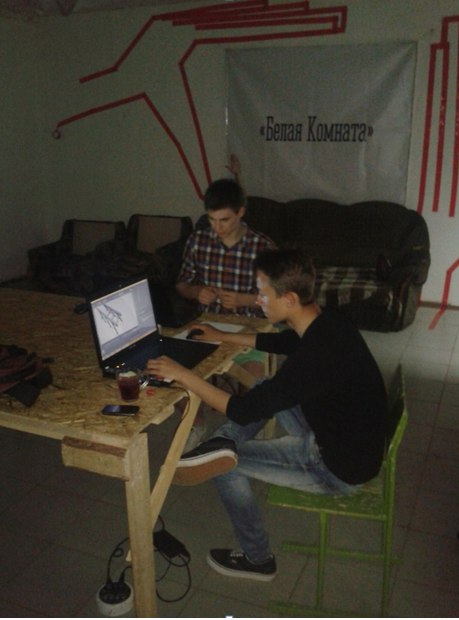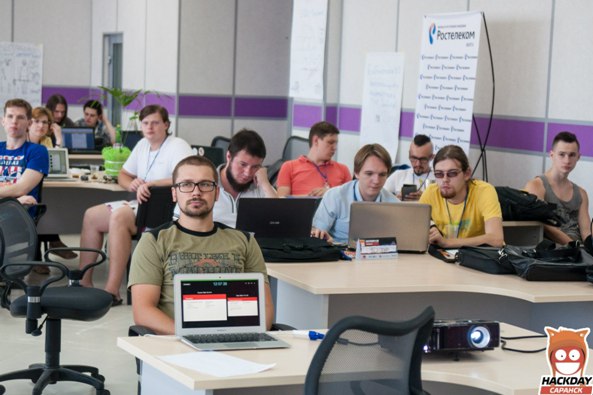The importance of time management in game development
A lot of books have been written and songs have been sung about the need to do what is interesting, turning hobbies into a source of income and the main occupation. And everywhere the starting point (boring life, uninteresting environment) and the end point (changing life for the better, a feeling of happiness, etc.) are described everywhere. But nowhere is it written how many rakes (and, most importantly, how many times) must be stepped in order to get from point "A" to point "B".
We tried to turn a hobby into a professional occupation. The foundation was laid in 2013, when I and 4 other classmates decided to start developing games. About 6 months we spent on training in working with graphics, programming nuances and more. Already in the process of self-education, the idea of creating a game came up that turned out to be so large-scale that it would take months or even years to realize it. And resources ... big resources that we don’t have. Therefore, we thought it was worth starting with a simpler and more likely to implement option - an indie game with many endings. Following the principle of minimizing costs, we rented an “office” on the outskirts of our small town. The savings made it possible to gain work experience “at any cost” and “under any circumstances”: in order to begin work on a project in the atmosphere, to put it mildly, not adapted for this (since the office was located on the site used by creative people to search for inspiration). Thus, in search of a catalyst for the development of the project, we came across several barriers.

The first rake
• Ineffective time management and the lack of a structured work plan: team work in the office began to bring more results than remote, but the lack of a schedule, a clear separation of duties and tasks, a tactical work plan and strategy turned the process of creating the game into chaotic actions, results which were difficult to predict.
• Wrongly selected and organized workspace. As I said, we rented an office in a place intended for creative searches, so at the very beginning of work on the project, the shortcomings of personal concentration and self-discipline were amplified due to a large number of distractions.
• Lack of experience. This was our first major project, which we wanted to bring to consumers. However, not everything that was conceived and planned turned out to be done on time, since there was a lack of skills in developing and organizing the work process.
Bottom line : one part of the game + uncorrected bugs.
Subjective metrics:
- 450 man-hours spent (a metric that combines all the time spent by each team member)
- 50 models made
- 9 sprites drawn
- 17 animations done
~ 35 scripts written
After working for a month in this mode, we realized that in this way we could not successfully complete the project. They began to look for development opportunities and learned about the well-known Hackday (48-hour programming marathon) in Saransk and decided to take part in it. Confident that there was no chance of victory, we began preparations for the hackathon by developing an idea that we could implement in 48 hours. As a result, despite the lack of experience, we settled on the option of creating a mobile game.

Professional slang, which we do not always understand, limited time and space, the existence of certain rules (“no code before the event”) complicated and, at the same time, spurred us on. And after 48 hours we had a working prototype - the game " Clicker Bands". Presenting the results of the work to HackDay experts, we won the Startup nomination.
Winning the hackathon, as well as the opportunity to work in the coworking of one of the organizers, allowed us to finalize the game.
And now that the product is ready, we have analyzed the factors that allowed us to carry out a large amount of work in a short time, and came to the conclusion that the right time management turned out to be the most effective .
• According to the First Law of Parkinson, published in 1955, the work fills all the time allotted to it. In the hackathon were given as much as possible short deadlines that we managed to meet, roughly speaking, the earlier the deadline, the less time for procrastination.
• Checkpoint. Every day, project managers gathered at the site at a certain time and talked about the results of the teams, as well as developed plans for further actions. Such “planning meetings” entered our schedule after the hackathon and allowed us to plan and structure the work.
In addition to improving the skills of managing your own time, you can highlight another factor that allowed us to complete the project - the competitive nature of the event. Competition increased motivation, and also allowed to identify the problem areas of the project and use its strengths.
Moreover, collective self-analysis revealed the advantages of participating in a hackathon and their impact on project implementation.
• Motivation. The victory at HackDay allowed me to believe in myself and gave me strength to finish the job.
• Dating. Also participating in the event was useful due to the availability of the educational part and consultations from leading employees of Russian IT companies, which we received both on Hackday and after it.
• Support. Thanks to the victory, we received from one of the organizers a free place in coworking.
• Coffee maker. We not only realized our plans, but also received a coffee maker as a gift.
Thanks to these factors, we finished the game and put it on the Play Market.
Again, subjective metrics :
- 1050 man-hours
- 169 sprites drawn
- 95 animations done
~ 76 scripts written
But this is not the end. This is the beginning of large-scale work on the commercialization of the project.
We tried to turn a hobby into a professional occupation. The foundation was laid in 2013, when I and 4 other classmates decided to start developing games. About 6 months we spent on training in working with graphics, programming nuances and more. Already in the process of self-education, the idea of creating a game came up that turned out to be so large-scale that it would take months or even years to realize it. And resources ... big resources that we don’t have. Therefore, we thought it was worth starting with a simpler and more likely to implement option - an indie game with many endings. Following the principle of minimizing costs, we rented an “office” on the outskirts of our small town. The savings made it possible to gain work experience “at any cost” and “under any circumstances”: in order to begin work on a project in the atmosphere, to put it mildly, not adapted for this (since the office was located on the site used by creative people to search for inspiration). Thus, in search of a catalyst for the development of the project, we came across several barriers.

The first rake
• Ineffective time management and the lack of a structured work plan: team work in the office began to bring more results than remote, but the lack of a schedule, a clear separation of duties and tasks, a tactical work plan and strategy turned the process of creating the game into chaotic actions, results which were difficult to predict.
• Wrongly selected and organized workspace. As I said, we rented an office in a place intended for creative searches, so at the very beginning of work on the project, the shortcomings of personal concentration and self-discipline were amplified due to a large number of distractions.
• Lack of experience. This was our first major project, which we wanted to bring to consumers. However, not everything that was conceived and planned turned out to be done on time, since there was a lack of skills in developing and organizing the work process.
Bottom line : one part of the game + uncorrected bugs.
Subjective metrics:
- 450 man-hours spent (a metric that combines all the time spent by each team member)
- 50 models made
- 9 sprites drawn
- 17 animations done
~ 35 scripts written
After working for a month in this mode, we realized that in this way we could not successfully complete the project. They began to look for development opportunities and learned about the well-known Hackday (48-hour programming marathon) in Saransk and decided to take part in it. Confident that there was no chance of victory, we began preparations for the hackathon by developing an idea that we could implement in 48 hours. As a result, despite the lack of experience, we settled on the option of creating a mobile game.

Professional slang, which we do not always understand, limited time and space, the existence of certain rules (“no code before the event”) complicated and, at the same time, spurred us on. And after 48 hours we had a working prototype - the game " Clicker Bands". Presenting the results of the work to HackDay experts, we won the Startup nomination.
Winning the hackathon, as well as the opportunity to work in the coworking of one of the organizers, allowed us to finalize the game.
And now that the product is ready, we have analyzed the factors that allowed us to carry out a large amount of work in a short time, and came to the conclusion that the right time management turned out to be the most effective .
• According to the First Law of Parkinson, published in 1955, the work fills all the time allotted to it. In the hackathon were given as much as possible short deadlines that we managed to meet, roughly speaking, the earlier the deadline, the less time for procrastination.
• Checkpoint. Every day, project managers gathered at the site at a certain time and talked about the results of the teams, as well as developed plans for further actions. Such “planning meetings” entered our schedule after the hackathon and allowed us to plan and structure the work.
In addition to improving the skills of managing your own time, you can highlight another factor that allowed us to complete the project - the competitive nature of the event. Competition increased motivation, and also allowed to identify the problem areas of the project and use its strengths.
Moreover, collective self-analysis revealed the advantages of participating in a hackathon and their impact on project implementation.
• Motivation. The victory at HackDay allowed me to believe in myself and gave me strength to finish the job.
• Dating. Also participating in the event was useful due to the availability of the educational part and consultations from leading employees of Russian IT companies, which we received both on Hackday and after it.
• Support. Thanks to the victory, we received from one of the organizers a free place in coworking.
• Coffee maker. We not only realized our plans, but also received a coffee maker as a gift.
Thanks to these factors, we finished the game and put it on the Play Market.
Again, subjective metrics :
- 1050 man-hours
- 169 sprites drawn
- 95 animations done
~ 76 scripts written
But this is not the end. This is the beginning of large-scale work on the commercialization of the project.
